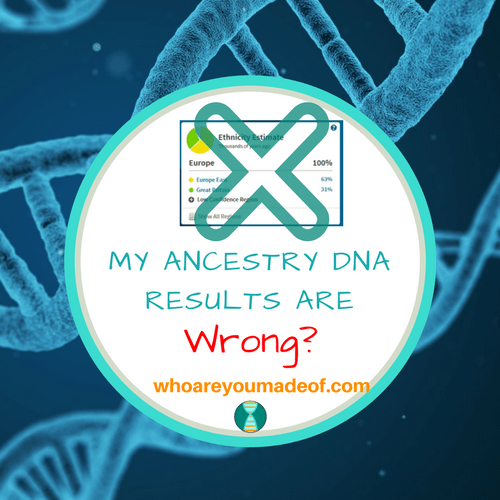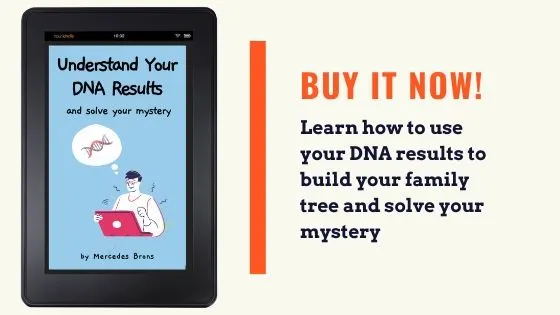If you got your Ancestry DNA results back, and they show you something that you weren't expecting to see, you might have some lots of questions about the test. For example, you might want to know : Is it possible that my Ancestry DNA results are wrong?
How accurate is the Ancestry DNA test? How do they come up with these results? You've come to the right place.

Whether you are concerned about your ethnicity estimate not matching your known family history, or unexpected DNA matches popping up, you'll find some answers here.
My Ancestry DNA results are wrong!
I'll start off this section with saying that it is very, very unusual to have incorrect Ancestry DNA results. Obviously, any time that there is human involvement in a process, as is the case with the DNA testing process, there is a chance for error.
There is an extremely small chance that your test results don't belong to you. If you and a sibling or spouse sent off your test together, there's always a possibility that you mixed up the samples.
While the laboratories have protocols that try to avoid samples becoming mixed up, it does occasionally happen.
With all of this said, if you are hoping that your DNA test results are wrong, statistics are not on your side. If you want me to be completely honest with you, your test results are probably right.
The probability that your test is wrong is minuscule. It's not zero, but it's very, very small.
Is your Ancestry ethnicity estimate wrong?
Ethnicity is the most common reason for people to do DNA tests, like the ones offered by 23 and Me and Ancestry DNA. Most people are proud of their ancestry - no matter what it is.
Many people grow up with a very distinct idea of their family's particular history, and so they can be very surprised, or even disappointed or angry, when their ethnicity results show something different from what they grew up believing.
It's important to know that the technology behind ethnicity estimates is still new. Also, you will find that most companies report an ethnicity "estimate". The key word is estimate.
It's not an exact science. With all of this said, if your known family history is correct, and you haven't uncovered any real surprises, your ethnicity results will typically show regions that are near where you believe that they should be. What am I trying to say?
For example, if your family is Irish and German, and you're sure, then your ethnicity results will probably show Irish, Western Europe, and other nearby regions like Iberian Peninsula, Scandinavia, and maybe even Eastern Europe.
Why?
We have this mistaken belief that our ancestors lived in tiny little villages and never left, living their whole lives within a 20 mile radius of where they were born. The reality is much different, and even though it's true that it was much more difficult to travel hundreds of years ago, travel they did.
There were dozens of reasons that people traveled hundreds of miles away from their home village, and sometimes the results of this travel will show up on our DNA test results.
Wars, famine, migration, marriage, raids, commerce, slavery, mis-attributed paternity, and rape are just some of the reasons that our DNA results can show ethnicities that we weren't expecting to see. Even if these events happened 200 years ago - or more - they can still show up in our DNA today and cause us confusion and even anxiety.
The best thing to do is take your ethnicity results with a grain or two of salt, and use them as a general guide in your family tree research.
Is your DNA match list from Ancestry wrong?
Your DNA match list from Ancestry is unlikely to be incorrect. There are a few ways to analyze why your DNA match list might appear incorrect, however.
If you just find a few strange close matches, but everyone else seems "right", then there is almost no chance that your results are wrong. You will need to set off to figure out exactly who these people are to you, and which part of your known family history is incorrect.
People are surprised by their DNA test results every day, so you are not alone. Finding out that you have half-siblings, first cousins, or even a biological parent that you didn't even know about is actually much more common than you might think.
If you do not recognize a single person on your DNA match list, then a closer examination of your entire DNA testing journey is in order.
We've already established that the DNA results are almost certainly correct, but finding a completely "wrong" list of DNA matches is of more consequence than a list that has some people that you recognize and others who are unfamiliar.
I have heard stories of a married couple both doing their tests at the same time and accidentally placing their saliva sample into the other person's box before mailing them back for analysis. This has also happened at least once, according to a story I read on Facebook, when close friends or relatives both did their tests on the same day together.
In other words, the "switch-up" happened at home, before the test even made it to the laboratory.
Of course, if you truly doubt your results, I would recommend doing the test again.
What should I do with what I've learned from my DNA test?
It can be very shocking to see a close relative match that you don't know, or find out that one of the relatives that you grew up with might not share genetic material with you. The most important thing to remember about your family is that family is much more than just DNA.
A DNA test can never take away the feelings and shared experiences that you have for and with your family members.
If you feel pretty confident that, after reading this post, your DNA test results are probably right, should you share this information with your family? Should you contact your newly discovered close family members?
There is no right way or wrong way to handle the information that you've learned. If you had not taken the DNA test, you would not have learned what you know.
My personal experience has taught me that your DNA is private. It's yours. You are not obligated to tell anyone anything about your test results, no matter what you've learned.
Some people might disagree, citing the fact that "family secrets" have been hidden long enough, and that it's time for people to stop hiding. The reality is that the truth, and life, is much more complicated than a simple black and white rule.
If you feel like it is better to keep your test results to yourself, then that is what you should do.
How to find out if your DNA results are correct
If you feel like your results might be correct, while surprising, you might want to know that with an Ancestry subscription, you will be able to view the family trees of your matches, view Common Ancestor Hints, and Ancestry DNA ThruLines.
These additional features are an excellent way to leverage the ability to verify your family knowledge, and explore the ancestry of your matches (who also share ancestry with you).
You can use the link below to get a two week free trial. If you end up purchasing a subscription at the end of your free trial, I may receive a small commission (at absolutely no extra cost to you) which helps me support this website, so thanks!:
Conclusion
I hope that you feel a little better about your DNA test results, and feel a little more confident about what to do with the information you have learned. Do you have any questions or stories you'd like to share here?
I'd love to hear from you in the comments.
Thanks for stopping by!


Bobby Maddox
Saturday 28th of January 2023
I don't think my DNA results are correct. I don't know anyone listed as 1st or 2nd cousins.
Bobby Maddox
Saturday 28th of January 2023
I don't know anyone listed as close relative.
Jozsef
Monday 8th of August 2022
I did the DNA test on Ancestry (Canada) and so did my son(US) and we find the results fairly accurate. What we found to be wrong is their search for common DNA matches; for example in my son's DNA matches appears John Doe as DNA match and so does it on my DNA matches. If I get the Common DNA Matches between my self and John Doe my son DOESN'T appear in the common DNA relatives list. So I asked my son to get his common DNA matches and John Doe and in my sons list I do appear. Definitely a serious bug.
We also noticed that on the US site my son's DNA matches list it shows for each match if the person belong to my side as FATHER'S side and if it belongs to my wife's side it leaves that blank, which is great. On the Canadian website that feature doesn't exist.
Lisa Ontiveros
Tuesday 3rd of May 2022
My half sister and I both did Ancestry DNA. We have different fathers. Our results show us sharing 27% DNA, as expected. But my results show an unknown individual as being my mother. This person also shares matches with me on both the maternal and paternal sides of my family. HOW IS THIS POSSIBLE?
Still in Shock
Sunday 16th of January 2022
It happened to me. Still in shock.